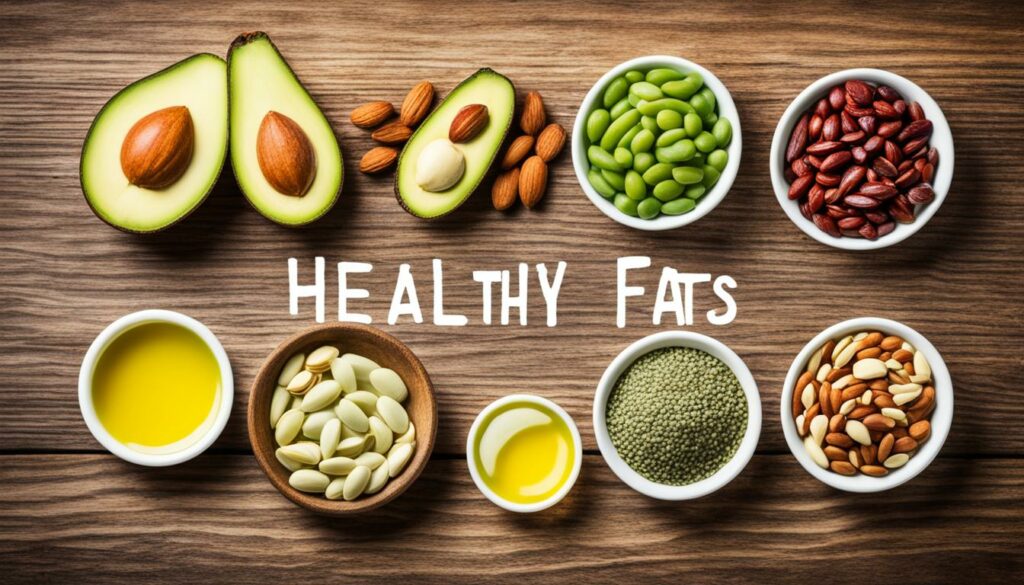Did you know that a balanced intake of polyunsaturated and monounsaturated fats can have remarkable benefits for your overall health? These healthy fats, also known as dietary fats, play a crucial role in maintaining essential bodily functions and promoting optimal well-being.
Polyunsaturated fats, such as omega-3 and omega-6 fatty acids, have been associated with improved heart health, lower cholesterol levels, and reduced inflammation. On the other hand, monounsaturated fats have shown to lower bad (LDL) cholesterol levels and support cell health.
The health benefits of these unsaturated fats go beyond cardiovascular health. They are also essential for brain function, weight management and sexual health, making them an integral part of a balanced diet.
Healthy Fats for Sexual Health
Polyunsaturated and monounsaturated fats are both considered “good” fats, offering numerous health benefits, including potential positive effects on sexual health. These fats are essential for hormone production, including sex hormones like testosterone and estrogen, which play a significant role in sexual function and libido.
Here’s how each type of fat can contribute to sexual health:
Polyunsaturated Fats
- Omega-3 Fatty Acids: Found in fatty fish (like salmon, mackerel, and sardines), flaxseeds, chia seeds, and walnuts, omega-3 fatty acids are crucial for heart health and blood circulation. Improved circulation can lead to better erectile function in men and enhanced arousal in women by promoting blood flow to the genital area.
- Hormone Production: These fats are vital for producing hormones that regulate sexual function.
- Anti-inflammatory Properties: Omega-3s have anti-inflammatory effects, which can help reduce conditions that impair sexual health, such as heart disease and high cholesterol.
Monounsaturated Fats
- Heart Health: Foods high in monounsaturated fats, such as avocados, olive oil, and nuts, support heart health. A healthy heart is essential for good circulation, which is crucial for sexual arousal and performance.
- Hormone Balance: Monounsaturated fats help maintain healthy cholesterol levels, which is necessary for hormone production, including sex hormones.
- Energy and Mood: These fats can also help with energy levels and mood stabilization, indirectly supporting a healthy sex life by improving overall well-being.
Combined Benefits
- Improved Cardiovascular Health: Both types of fats contribute to a healthier cardiovascular system, which is directly linked to sexual health. Good blood flow is essential for erectile function and vaginal lubrication.
- Hormonal Health: Adequate intake of good fats is crucial for the production and balance of hormones related to sexual desire and reproductive health.
- Reduced Risk of Erectile Dysfunction: A diet rich in good fats can lower the risk of developing conditions like erectile dysfunction in men, as these conditions are often linked to cardiovascular issues.
Incorporating Healthy Fats for Sexual Health
To harness these benefits, it’s important to include a variety of sources of both polyunsaturated and monounsaturated fats in your diet. This can be achieved by consuming a balanced diet that includes fish, nuts, seeds, avocados, and using oils like olive oil for cooking and dressings.
Incorporating polyunsaturated and monounsaturated fats into your diet can support sexual health by improving heart health, enhancing blood flow, and maintaining hormone balance. As part of a holistic approach to wellness, these fats should be included in a balanced diet that supports overall health and sexual well-being.
In this article, we will explore the specific benefits of both polyunsaturated and monounsaturated fats and understand how they contribute to your overall well-being. By the end, you’ll have a clear understanding of why these healthy fats deserve a prominent place in your diet.
Key Takeaways:
- Polyunsaturated and monounsaturated fats offer numerous nutritional benefits for your body.
- Polyunsaturated fats promote heart health, lower cholesterol levels, and reduce inflammation.
- Monounsaturated fats lower bad (LDL) cholesterol levels and support cell health.
- Both types of fats are essential for brain function and weight management.
- Incorporating polyunsaturated and monounsaturated fats into your diet can contribute to better cardiovascular health and overall well-being.
Monounsaturated Fats Benefits
Monounsaturated fats are a type of healthy fats that provide several benefits, including lower cholesterol levels and improved cell health. These fats have a single carbon-to-carbon double bond in their molecular structure, which gives them unique properties.
A key advantage of monounsaturated fats is their ability to reduce bad (LDL) cholesterol levels in the body. High levels of LDL cholesterol can contribute to heart disease and other cardiovascular health issues.
By incorporating monounsaturated fats into your diet, such as through the consumption of healthy foods, you can help maintain optimal cholesterol levels and promote heart health.
Furthermore, monounsaturated fats play a crucial role in supporting the overall health of cells. They contribute to the integrity and functionality of cell membranes, ensuring proper cell communication and functioning. Additionally, these fats help regulate inflammation within the body, promoting a healthy immune response.
Healthy Foods High in Monounsaturated Fats
To reap the benefits of monounsaturated fats, include the following foods in your diet:
- Olive oil: A staple of Mediterranean cuisine, olive oil is rich in monounsaturated fats and offers numerous health benefits. Use it as a cooking oil or drizzle it over salads for a flavor boost.
- Avocado: This creamy fruit is not only delicious but also high in monounsaturated fats. Add sliced avocado to sandwiches, salads, or enjoy it as guacamole.
- Nuts: Varieties like peanuts, cashews, and almonds are excellent sources of monounsaturated fats. Snack on a handful of nuts or incorporate them into your favorite recipes.
- Olives: Whether added to salads or used in cooking, olives are another food rich in monounsaturated fats. They offer a burst of flavor and nutritional benefits.
- Sesame seeds: Sprinkle these seeds on top of dishes or use them to make homemade tahini. They are not only a great source of monounsaturated fats but also rich in other nutrients.
Discover the power of monounsaturated fats by incorporating these healthy foods into your diet. Enjoy the delicious flavors while promoting heart health and supporting your body’s cellular functions.
Polyunsaturated Fats Benefits
Polyunsaturated fats, along with monounsaturated fats, are essential components of a healthy diet. These fats have been shown to have numerous benefits for our overall health, including the ability to lower LDL cholesterol levels and promote cell health.
One of the key roles of polyunsaturated fats is in building and maintaining cell membranes. The double bonds in their carbon structure contribute to the fluidity and flexibility of cell membranes, allowing them to function optimally. This is important for the proper functioning of cells throughout the body.
Polyunsaturated fats also play a crucial role in blood clotting. One specific type of polyunsaturated fat, known as omega-3 fatty acids, helps regulate the clotting process in our bodies, preventing excessive clot formation that can lead to serious health issues.
When it comes to including polyunsaturated fats in our diet, there are several foods that are excellent sources of these healthy fats. These include:
- Sunflower seeds
- Flaxseeds
- Cooking oils like corn oil, safflower oil, and soybean oil
- Nuts such as walnuts, pine nuts, and Brazil nuts
- Fatty fish like salmon, mackerel, herring, albacore tuna, and trout
By incorporating these foods into our meals, we can increase our intake of polyunsaturated fats and reap the associated health benefits they offer.

Overall, polyunsaturated fats play a vital role in our body’s functions and offer numerous health benefits. From promoting cell health to reducing cholesterol levels and aiding in blood clotting, these healthy fats are a valuable addition to a balanced diet.
Unsaturated Fats vs Saturated Fats
Unsaturated fats and saturated fats have distinct impacts on health, particularly concerning cardiovascular disease and cholesterol levels. Unsaturated fats are considered healthy fats that can contribute to overall well-being, while saturated fats have long been associated with an increased risk of cardiovascular disease.
Research suggests that substituting unsaturated fats, such as monounsaturated and polyunsaturated fats, for saturated fats can have significant benefits for heart health. This dietary shift has been proven to improve cholesterol levels and reduce the risk of heart disease.
Sources of saturated fats include cheese, whole and reduced-fat milk, meat products, cookies, and other grain-based desserts. To promote cardiovascular health, it is recommended to limit saturated fat intake to less than 10% of daily calories. Some organizations even advocate for a more stringent limit of no more than 7% of daily calories.
Choosing unsaturated fats over saturated fats whenever possible is essential for maintaining a heart-healthy diet. This means incorporating foods rich in monounsaturated fats, such as olive oil, avocado, nuts, olives, and sesame seeds.
It also means including foods high in polyunsaturated fats, like sunflower seeds, flaxseeds, cooking oils (e.g., corn oil, safflower oil, and soybean oil), nuts (e.g., walnuts, pine nuts, and Brazil nuts), and fatty fish (e.g., salmon, mackerel, herring, albacore tuna, and trout).
By prioritizing the consumption of unsaturated fats and reducing the intake of saturated fats, individuals can make positive changes to their cardiovascular health, cholesterol levels, and overall well-being.
Key Points:
- Unsaturated fats are healthy fats, while saturated fats are associated with an increased risk of cardiovascular disease.
- Replacing saturated fats with unsaturated fats improves cholesterol levels and reduces the risk of heart disease.
- Saturated fat sources include cheese, whole and reduced-fat milk, meat products, cookies, and grain-based desserts.
- It is recommended to limit saturated fat intake to less than 10% of daily calories, with some organizations advocating for no more than 7%.
- Choose foods rich in monounsaturated fats (e.g., olive oil, avocado, nuts, olives, and sesame seeds) and polyunsaturated fats (e.g., sunflower seeds, flaxseeds, cooking oils, nuts, and fatty fish) for a heart-healthy diet.

Conclusion
In conclusion, both polyunsaturated and monounsaturated fats provide a range of nutritional health benefits. These healthy fats play a crucial role in promoting heart health, improving cholesterol levels, enhancing brain function, managing inflammation, and contributing to weight management.
Monounsaturated fats have been found to effectively lower bad (LDL) cholesterol levels and maintain overall cell health. They can be obtained from foods such as olive oil, avocado, nuts, olives, and sesame seeds.
On the other hand, polyunsaturated fats are essential for building cell membranes, aiding blood clotting, and supporting brain function. Sources of polyunsaturated fats include sunflower seeds, flaxseeds, cooking oils, nuts, and fatty fish.
To improve cardiovascular health and overall well-being, it is recommended to replace saturated fats with unsaturated fats, including both polyunsaturated and monounsaturated fats.
By making this dietary change, individuals can enjoy the benefits of better cholesterol levels, reduced inflammation, and enhanced weight management.
FAQ
What are the benefits of polyunsaturated fats compared to monounsaturated fats?
Both polyunsaturated fats and monounsaturated fats offer numerous nutritional health benefits. They promote good cholesterol levels, support heart health, aid in brain function, help manage inflammation, and contribute to weight management. While monounsaturated fats have been found to lower bad cholesterol levels and maintain overall cell health, polyunsaturated fats are essential for building cell membranes, blood clotting, and brain function.
What are the benefits of monounsaturated fats?
Monounsaturated fats have been found to lower bad (LDL) cholesterol levels and contribute to the overall health of cells. They can be obtained from the diet and are present in cooking oils like olive oil, sesame oil, and canola oil, as well as peanut butter, nuts such as peanuts and cashews, avocados, olives, sesame seeds, and spreads labeled “high oleic.”
What are the benefits of polyunsaturated fats?
Polyunsaturated fats, like monounsaturated fats, have been shown to lower LDL cholesterol levels and have positive effects on cell health. They are essential for the body’s functions and play a role in building cell membranes and blood clotting. Key sources of polyunsaturated fats include sunflower seeds, flaxseeds, cooking oils like corn oil, safflower oil, and soybean oil, nuts such as walnuts, pine nuts, and Brazil nuts, and fatty fish like salmon, mackerel, herring, albacore tuna, and trout.
How do unsaturated fats compare to saturated fats?
Unsaturated fats, including both monounsaturated and polyunsaturated fats, are considered beneficial for heart health and overall well-being. They can improve cholesterol levels and decrease the risk of heart disease when replacing saturated fats in the diet. Sources of saturated fats include cheese, whole and reduced-fat milk, meat products, cookies, and other grain-based desserts. Dietary guidelines recommend limiting saturated fat intake to less than 10% of daily calories, with some organizations recommending no more than 7%. It is important to choose unsaturated fats over saturated fats whenever possible.




